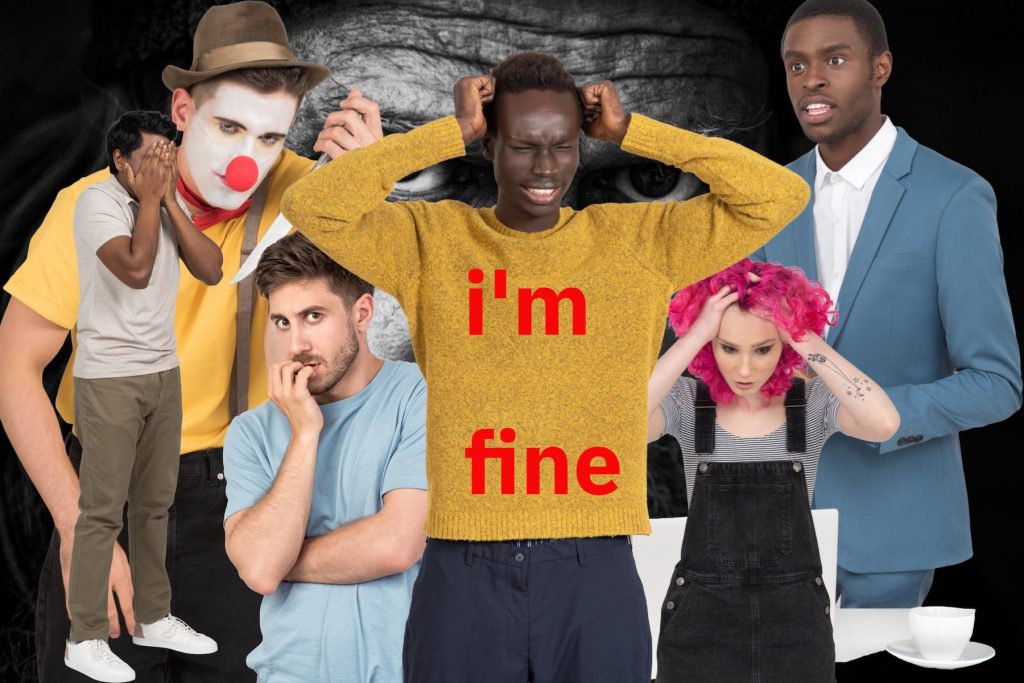Situation
I first notice that I’m starting to breathe heavily. My mind is racing and jumping. I feel like I’m doing a lot. Tons of pressure. But I’m just sitting on the floor, listening to a podcast. I want to be up; doing other things. More interesting things than just sit in this empty room and listen to a podcast by myself.
“Oh god, this has no meaning. I’m missing the meaning. Is this all there is? This is all there is and that’s fine. I know it’s fine but it doesn’t feel fine.”
:: hyperventilating ::
I’m not doing the meaning. Oh no, it’s all wrong. Nothing matters.
:: rocking in the corner ::
We’re so far past the beginning, and I don’t know where to start. How did we got here. What am I even thinking about?
Anxiety and panic are different. Panic attacks can strike without warning, while anxiety builds gradually and can usually be traced back to explicit triggers.
Despite these differences, they share similar characteristics; feeling like you have no control, that you are behind, and completely overwhelmed by consequences. The combination of negative emotions, physical discomfort, and neurochemical fight-or-flight response are awful and can cause more dangerous reactions. Fears overwhelms reason. Flooded, our minds shut down.
On top of that, we might justify feelings with negative thoughts. “If I feel like a failure, then I must be a failure.” We can become neurochemically addicted to the dopamine from negative feelings. And we may begin to seek it in reliable, predictable ways. Insecurity is an insidious adversary.
Observation
I’m spinning out. Like a dog chasing its own tail. I’ve been here many times:
- Emotionally flooded
- Mentally overloaded
- Nervous system going berserk
- Total shutdown
I acknowledge the situation and breathe, stepping back from myself. Becoming an observer. I recognize the emotionally exhausted and frantic animal in front of me. I shake my head. It’s bad, but not as bad as last time. Progress.
My breath becomes constant and unhurried. My thoughts become less hectic and my mind pursues them without the frantic conviction. My mind is calm and empty. My hands are back at the wheel.
Can we anticipate these feelings?
Well, if you’ve ever had anxiety or a panic attack, chances are good that you will experience them again. So we know it’s coming. It’s out there. Like an invisible cloud of bad feelings that we might accidentally step into. We know it will happen.
Could we detect them before they snowball and derail our best intentions?
Sometimes. But only when we know what to look for. Anonymous things have mysterious power. Observe and reflect on your experience with feelings. Give the big feelings names and record their schedule of returning. Know them when you see them. They don’t tell you what to do. Not anymore.
Awareness
Once you notice the panic or anxiety, center yourself. A little exercise, a song, or repeating an empowering mantra can help.
Take deep breaths, and step away from your present consciousness. Zoom out to view your entire situation in context. Observe yourself as a third party. Those worries aren’t mine. They don’t define this person.
Set an egg timer for five minutes and do nothing. REALLY do it. Not just thinking about it. Walk across the room, pick up the timer, and spin the dial right now. Sit and clear your body of the negativity. Do nothing for now, or you will remain paralyzed. Take the medicine. Just breathe.
Could that help us diminish their power?
“You know you’ll be depressed (anxious, upset, chaotic) three days a week. What are some things you can do even when you’re depressed?” –My Coach
Write them down. Feel however you want. Action will make you feel fulfilled. Motion, curiosity, and progress will revitalize your spirit.
Intention
Reestablish the stable center inside yourself from which to make a plan.
- What do you want?
- What’s in the way?
- What are you gonna do about it?
Write each of your answers in one clear sentence.
Could we overcome them?
Maybe. We can certainly diminish their influence on our actions. The earlier you can recognize some consistent features of your anxiety or panic, the earlier you can challenge. This will diminish their influence.
Action
Connect emotionally with the feeling you will have upon completion of the intended action?
Willpower alone is not enough. It will never be enough.
Action comes from your emotional drive.
Even a small thing can get you started, but it needs to be real action.
Research is not action. Thinking is not action. We like it because it is safe.
Actions change you. Actions change the world.



